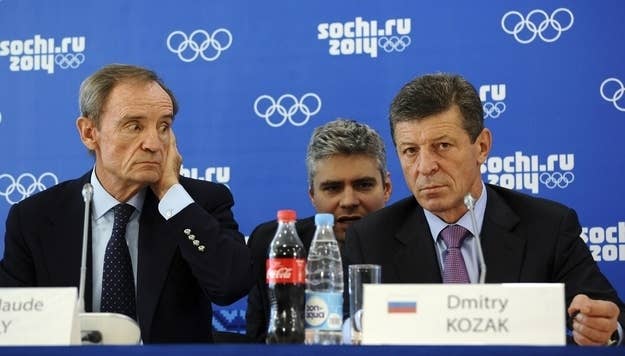
NEW YORK CITY — The International Olympic Committee spent Thursday attempting to explain that it was not endorsing Russia's anti-LGBT propaganda law — just that it concluded Russia's anti-LGBT law would not violate the Olympic Charter during the Winter Olympics in Sochi.
Noting that "the IOC doesn't really have the right to discuss the laws in the country where the Olympic Games are organized," Jean-Claude Killy, the IOC official running the final site visit to Sochi before the games, told reporters, "As long as the Olympic Charter is respected, we are satisfied, and that is the case."
Threading that needle was a difficult prospect from the start — the charter states that "[t]he IOC's role is … to act against any form of discrimination affecting the Olympic Movement" — and Russia hasn't done the IOC many favors over the past months. Despite that, the IOC on Thursday tried its best to end the debate over the impact of Russia's law against "propaganda of nontraditional sexual relations" on the Olympics.
The IOC reached that conclusion by determining that athletes and spectators would not face anti-LGBT discrimination while in Sochi for the Winter Olympics.
The IOC's response leaves most questions unanswered about what actually will happen when the people of the world converge on Sochi. It also rather clearly answers the question of whether the IOC believes it has any role in more broadly addressing anti-LGBT laws in nations it chooses to host the Olympics.
The IOC's Thursday attempt to end the debate — which clumsily involved the IOC seeking a correction to the initial Associated Press story and even putting out its own statement about the AP report — likely will not be successful.
As has been seen in the back-and-forth, contradictory statements of Russian officials over the past months, the IOC cannot control the Russians. Even as the IOC attempted to minimize concerns over the scope and impact of the new law and President Vladimir Putin's ban on protests in Sochi, Russian officials earlier this week detained Russians waving signs in support of LGBT pride in front of the headquarters of the Sochi Olympics organizing committee. Will Russian officials react the same if and when attendees at the Olympics decide to similarly display LGBT-supportive signs in public?
Earlier this month, the Russian media oversight body warned a popular Russian TV channel that its presentation of a French musical with gay content violated the anti-LGBT propaganda law. What happens in February, should NBC have a public, big-screen display of its Olympics coverage in the Olympic Village and the station presents one of its glowing profiles of an athlete who is out and proud?
Then, there are the activists. After the Thursday announcement, the Human Rights Campaign's president, Chad Griffin, issued a blistering statement, saying, "If this law doesn't violate the IOC's charter, then the charter is completely meaningless. The safety of millions of LGBT Russians and international travelers is at risk, and by all accounts the IOC has completely neglected its responsibility to Olympic athletes, sponsors and fans from around the world."
Will the activists accept the IOC's decision? Andre Banks, the executive director of All Out, made it clear the answer is no.
"If the IOC is unwilling to protect the values of the Olympic Movement, then athletes, sponsors, fans and participating governments must speak out and defend the integrity of the Games," Bank said in a statement.
At the end of the day, though, it is athletes — not IOC officials or activists — who make history at the Olympics.
As was seen with Swedish high-jumper Emma Green-Tregaro's rainbow fingernails at the IAAF world championships, the athletes, ultimately, control the talk at and about these international competitions. What will the athletes do at the Sochi Olympics?
Such moments are one of the least expected and, thus, least controllable elements of the Olympics. An Olympic moment centered on opposition to Russian anti-LGBT discrimination or even LGBT rights more broadly — especially in our digital, social world — instantly could become more important than the hundreds of statements made from all sides in the run-up to the games.
As the Olympics draw nearer, the Russians, activists, and the IOC all are keenly aware of the importance of such a moment and — in their different ways and with opposing interests — all of their actions and statements are trying to influence and, eventually, setting the stage for whatever that moment might be.

